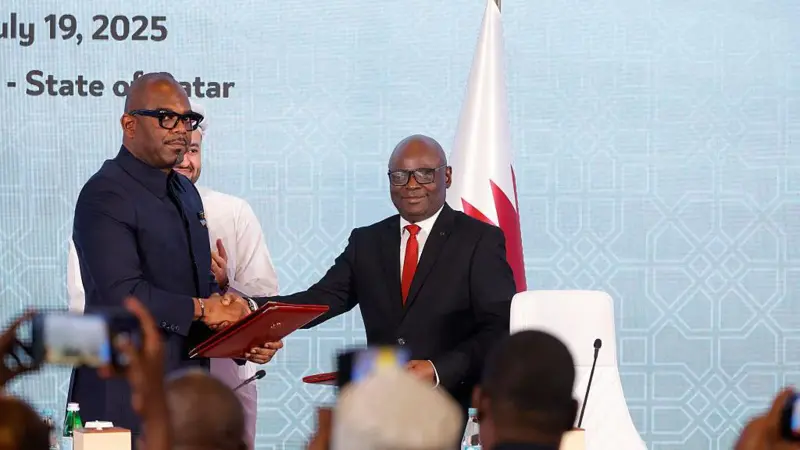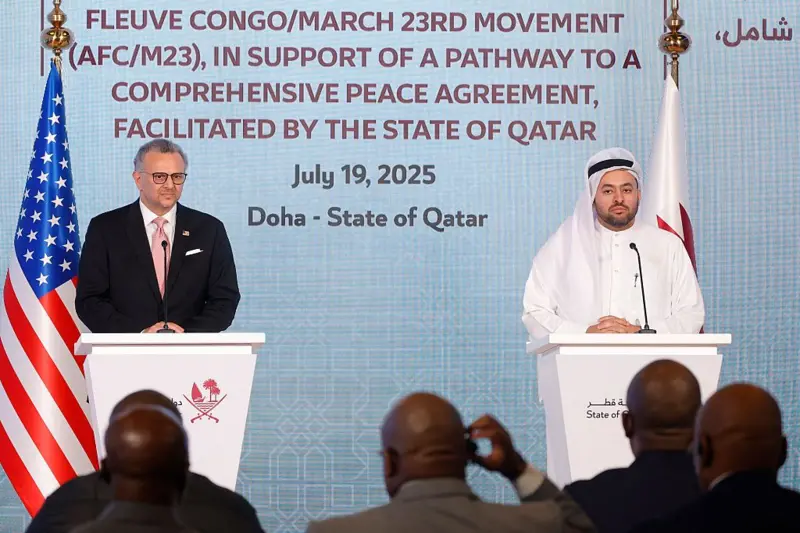Doha, Qatar – July 19, 2025, In a major diplomatic breakthrough, the government of the Democratic Republic of Congo (DRC) and the M23 rebel group have signed a set of guiding principles aimed at ending the protracted conflict in eastern Congo. The framework was signed on Saturday in Doha, Qatar, following three months of intensive negotiations mediated by the Qatari government.
Representing the Congolese government was Sumbu Sita Mambu, President Félix Tshisekedi’s chief envoy, while the M23 (also known as AFC/M23) was represented by its Executive Secretary, Benjamin Mbonimpa.
The Doha Principles, as they are being referred to, outline a joint commitment to a lasting ceasefire, non-aggression in all forms land, air, or water and an end to hate speech or incitement to violence. Notably, both parties agreed that the full restoration of state authority across all Congolese territory is a central pillar to achieving durable peace.
A key clause in the agreement reads:
“These principles will determine the modalities, phases, and timetable for the full reinstatement of state authority.”
This development follows the June 2025 Washington Agreement between Rwanda and the DRC brokered by the United States which also aimed at de-escalating a nearly 30-year-long cycle of violence in the mineral-rich eastern provinces.
A Broader Regional Momentum
The Doha Agreement has been lauded by the African Union as a “major step in the ongoing efforts toward sustainable peace, security, and stability in eastern DRC and the wider Great Lakes region.”
However, early signs of discord have emerged. DRC’s government spokesperson Patrick Muyaya emphasized that Kinshasa’s “red lines” remain non-negotiable. These include the immediate withdrawal of M23 from occupied territories and the restoration of state institutions military, police, and judiciary in those areas.
Muyaya noted on social media platform X:
“Today’s milestone opens the pathway toward a comprehensive peace agreement to be finalized in the coming days an agreement that will end this devastating conflict once and for all.”
On the other hand, AFC/M23 leader Bertrand Bisimwa offered a different interpretation, stating:
“Restoration of state authority does not necessarily mean military withdrawal, but rather empowering the state to fulfill its duties within those territories.”
International Endorsement and Strategic Timelines
Massad Boulos, former senior adviser on Africa to U.S. President Donald Trump, who attended the talks in Doha, reinforced that state sovereignty over national territory is fundamental, and that restoring such authority is “normal and necessary for any country.”
However, he cautioned that:
“Given the nature of the conflict, continuous dialogue, flexibility, and persistence are essential to achieving a truly inclusive and binding peace accord.”
Both parties committed to immediate implementation of the signed principles, with a deadline of July 29, 2025. Moreover, they pledged to begin direct peace talks no later than August 8, 2025, under the same Qatari mediation.
These talks will fall under the broader umbrella of the Rwanda-DRC peace process launched in Washington in June 2025. That agreement focused on mutual non-aggression, withdrawal of foreign troops (notably targeting Rwandan presence), and the dismantling of foreign armed groups operating in eastern Congo chief among them the FDLR, a militia opposed to Rwanda’s government and long accused of atrocities in the region.
Next Steps: Tshisekedi and Kagame to Meet in Washington
In the final phase of this peace roadmap, Presidents Tshisekedi and Kagame are expected to meet in Washington later this year to sign a comprehensive and final peace accord. Their foreign ministers had already signed a preliminary deal in June.
The success of this next meeting will hinge not only on mutual trust but also on the faithful implementation of disarmament, demobilization, and reintegration (DDR) strategies for non-state armed groups, and sustained international pressure to uphold the ceasefire.
Conclusion: Fragile Optimism amid Deep Wounds
While the Doha Principles mark a rare moment of optimism in a region ravaged by cycles of violence, analysts warn that implementation will be the true test. The eastern DRC remains a cauldron of competing interests political, ethnic, and economic fueled by access to valuable resources and regional rivalries.
If respected and followed through, this agreement could signal the beginning of a historic transformation for millions affected by the crisis. If not, it risks becoming yet another missed opportunity in Congo’s long struggle for peace.





